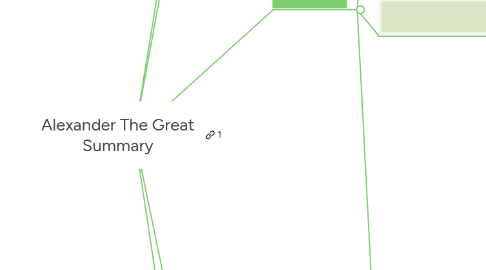
1. 1-Sentence-Summary:
1.1. Alexander The Great is one of the latest, most updated, and contemporary books on the life of the ancient, Macedonian king, who would extend his empire from a little slide of land in Greece through Persia, Egypt, all the way to India, forming the greatest empire the ancient world had ever seen.
2. Favorite quote from the author:
2.1. "There is nothing impossible to him who will try." - Alexander The Great
3. 3 lessons:
3.1. Always bundle your energy and resources to direct them towards one specific thing.
3.1.1. When Alexander the Great conquered Asia Minor (modern-day Turkey), he strategically bundled all of his resources and armed forces to achieve specific milestones.
3.1.2. A crucial city to take over was Miletus, which was a big base of the Persian navy at the time (334 BC).
3.1.3. The city initially surrendered right away, but soon the word spread that the Persian navy was about to strike.
3.1.4. While planning their battle, one of Alexander’s generals and advisors, Parmenion, spotted an eagle on one of the Greek ships, taking it as a sign to take the battle to sea
3.1.5. But seeing that the eagle looked towards the land, Alexander told him “no,” having had an insight: by bundling his forces to take the city, he could seize the docks and keep the Persian navy from ever reaching the shore.
3.1.6. After the decisive victory, he decided to bundle his resources again by disbanding the Greek navy.
3.1.6.1. He knew they’d never stand a chance against the Persian fleet anyway, and replicating this strategy of not allowing them to dock along the entire Mediterranean coastline was the more focused option.
3.2. Do what people wouldn’t expect you to do.
3.2.1. Concentrating his resources and efforts in small, but tactically important places would often lead Alexander the Great to go against what conventional wisdom of war would have him do, like leading his troops across high mountains in harsh winters or sneaking a few dancers into a city, who would then proceed to kill the soldiers they danced for at night.
3.2.2. One of Alexander’s greatest and most worthy adversaries was King Darius III, but after his victory over Persia by taking Persepolis, the capital, a traitor named Bessus killed the former king of Persia, which spurred Alexander into a mad chase.
3.2.2.1. Expecting to go home after their biggest feat, the Greek army wasn’t thrilled at the idea of chasing one guy all the way to India
3.2.2.2. But since continuing their quest was such an unexpected turn of events, Alexander managed to rally his troops with an inspiring speech.
3.2.3. Bessus hid behind the Hindu Kush mountains in modern-day Afghanistan, which are part of the Himalaya and average 15,000 feet in height.
3.2.4. He surely didn’t expect Alexander to be crazy enough to try and cross them in the midst of winter, so he didn’t leave behind any troops to guard the pass.
3.2.4.1. But after five long days, they started their descent and by the summer, they had caught up with a very (unhappily) surprised Bessus.
3.2.5. Often getting what you want is simply a matter of doing the opposite of what people expect.
3.3. Had it not been for Alexander’s empire, Christianity wouldn’t have had an audience to start with.
3.3.1. At 32 years old, Alexander the Great died very young.
3.3.2. Nevertheless, his legacy would extend far beyond himself.
3.3.2.1. Having touched three continents with his empire, Alexander changed the history of Greece, Persia (Iran), Egypt, Afghanistan, Pakistan, India as well as of all world religions, such as Christianity, Judaism, Buddhism and Islam.
3.3.2.2. For example, human Buddha statues take the Greek god of the sun, Apollo, as a role model and Alexander is mentioned in the Koran, because his Greek philosophy influenced the Islamic age.
3.3.2.3. The biggest impact was left on a place he never set foot in: Rome.
3.3.2.3.1. Greek was the language of intellectuals in the Roman empire, and their architecture and art heavily influenced what the Romans built.
3.3.2.4. When Christians and Jews first started to break away from the Roman empire, they used Greek to replicate their texts
3.3.2.4.1. It was only because Greek was the predominant language in all of the Mediterranean countries that Christianity had a ready, receptive audience to talk to!
3.3.3. Doing the unexpected is what it’s all about.
